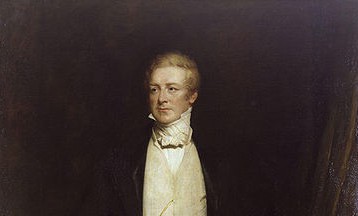
March 26, 2014, by Harry Cocks
Robert Peel: Conservatism, Liberalism and Reform in 19th Century Britain
Robert Peel’s record of achievements in politics would stand up against that of many British prime ministers. As Home Secretary in the 1820s he reformed England’s criminal code, established the Metropolitan Police (on which all later police forces were based), and gave civil rights to Catholics and nonconformist Protestants by repealing the Test and Corporation Acts that excluded them from the military, the universities and political office. When out of power between 1829 and 1841 he invented the idea of the “loyal opposition” in parliament and is often credited with creating the modern Conservative party, partly through issuing the first party manifesto at Tamworth in 1834. In the 1840s his Bank Charter Act regulated the banking system by centralising the issue of currency. He also encouraged free trade by repealing the Corn Laws that imposed tariffs on imported grain, though it is often held against him that a dogmatic adherence to economic liberalism, and a belief that free trade would solve the problem, helped to intensify the Irish Famine (1845-52). In two new articles that build on his 2010 biography of Peel, Richard Gaunt of Nottingham History revisits those achievements and their legacy (see links). Dr Gaunt points out the paradox of Peel’s career: although seen as the founder of modern Conservatism, he nevertheless split his party twice, first over Catholic Emancipation in 1829 and then almost fatally in 1846 by repealing the Corn Laws. Those who agreed with him (the “Peelites”) went over almost to a man to the Liberals, thereby helping not only to define and establish that party, but also to secure the long period of mid-Victorian Liberal hegemony between 1846 and 1874 (with the brief interruption of Disraeli’s first administration in 1868). Not surprisingly therefore, as Dr Gaunt points out, Peel was very concerned with his legacy. His concern for how he would be judged by history was an almost constant preoccupation.
Dr Gaunt’s recent articles focus on one aspect of Peel’s legislative achievements: the repeal of the seventeenth-century Test and Corporation Acts in 1828 that granted civil liberty to Protestants outside the Church of England. This change has usually been overshadowed by the larger campaign to secure Catholic emancipation, but, Gaunt argues, it should also be seen as one of the important moments of his career for three reasons: it was Peel’s first major challenge as leader of the house of commons in the Duke of Wellington’s ministry, while his handling of the issue revealed all his strengths and weaknesses in the role. Peel’s insistence on the active participation of the Church of England hierarchy in passing repeal with appropriate safeguards (through a declaration to be taken by the majority of officeholders) foreshadowed his later tactics in settling contentious church issues by negotiation with the church’s leaders. This led up to the formation of the Ecclesiastical Commission in 1835 which sought to reform the administration of the established church. Peel had initially thought that repeal of the Test and Corporation Acts would follow Catholic Emancipation, but was forced to change tack when Lord John Russell’s bill for repeal gathered support. The necessity of repealing laws that denied full citizenship to those outside the Anglican church formed a back-drop to that liberalisation (or ‘ripening’) in Peel’s views which commentators and historians have detected during this period. By 1829, Peel’s politics had begun to move away from the hard-edged Toryism of his early career and, as the repeal of the Test and Corporation Acts shows, took a more liberal direction.
Richard Gaunt, Robert Peel: Life and Legacy (Tauris, 2010)
http://www.amazon.co.uk/Sir-Robert-Peel-Library-Victorian/dp/1848850352
Richard A Gaunt, ‘Peel’s Other Repeal. The Test and Corporation Acts, 1828’ in Parliament, Politics and Policy in Britain and Ireland, c. 1680-1832: Essays in Honour of D.W. Hayton, edited by Clyve Jones and James Kelly (Oxford, 2014) which is also a special issue of Parliamentary History (33/1), pp.243-62
http://onlinelibrary.wiley.com/doi/10.1111/parh.2014.33.issue-1/issuetoc
http://onlinelibrary.wiley.com/doi/10.1111/parh.2014.33.issue-1/issuetoc
Richard A Gaunt, ‘Robert Peel and the Metropolitan Police’ in Jay Albinese, (editor), The Encyclopedia of Criminology and Criminal Justice (Oxford, 2014)
http://onlinelibrary.wiley.com/doi/10.1002/9781118517383.wbeccj044/abstract
Review of Robert Peel: Life and Legacy at IHR Reviews in History
http://www.history.ac.uk/reviews/review/1007
No comments yet, fill out a comment to be the first

Leave a Reply